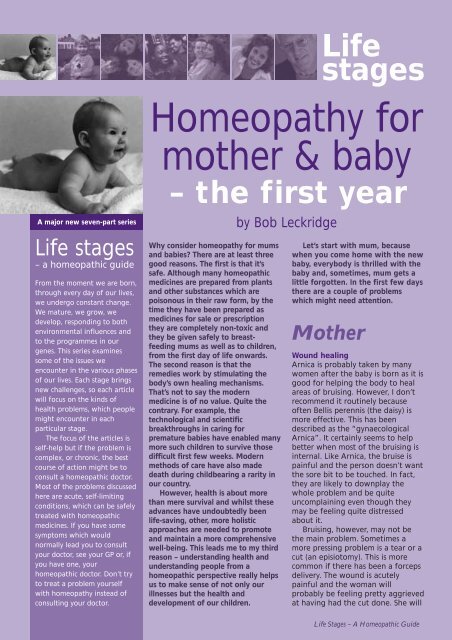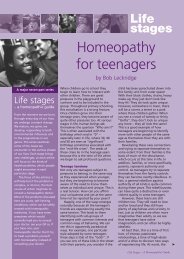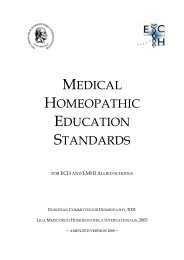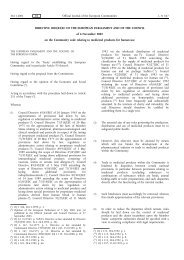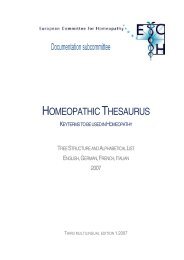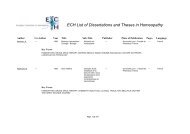Homeopathy for mother and baby
Homeopathy for mother and baby
Homeopathy for mother and baby
- TAGS
- homeopathy
You also want an ePaper? Increase the reach of your titles
YUMPU automatically turns print PDFs into web optimized ePapers that Google loves.
LifestagesImmunisationThis is a very difficult subject <strong>for</strong>parents. It’s all about trying tochoose the path of least risk <strong>for</strong>you child. I think you need toconsider each immunisationseparately. What is the diseasewhich we are trying to protect thechild from? How serious may thatdisease be <strong>for</strong> the child if theycatch it, <strong>and</strong> how significant is therisk of catching it? Afterconsideration of those questions,we then ask, what are the risksassociated with the immunisation?We then try to do the best <strong>for</strong> ourchildren <strong>and</strong> choose the lowestrisk. When you stop to considerthis you will realise that there areno rules, no hard <strong>and</strong> fastconclusions which are applicablein all children at all times <strong>and</strong> inall places.There isn’t a homeopathicalternative vaccinationprogramme. However, this doesn’tmean that homeopathy has norole to play here. There are twoapproaches to consider. Firstly,when it is judged that a particularimmunisation is a preferredchoice, <strong>and</strong> we go ahead <strong>and</strong>vaccinate a child, sometimes thereare obvious short term problemsafterwards. Homeopathicmedicines can help to treat, whatwe refer to as, ailments fromvaccination. This might beanything from a local reaction atthe site of the injection whichmay be hot, red <strong>and</strong> painful <strong>and</strong>need Belladonna, to bruisingwhich might be helped by Arnica,to local pain <strong>and</strong> discom<strong>for</strong>twhich might be helped by Ledum,which is great <strong>for</strong> puncturewounds. If there are more longlastingproblems after immunisationthen a dose of Thuja might helpto sort things out.Secondly, some peopleadvocate giving a child his or her“constitutional” remedy to boosthis or her immune system. Theidea of a “constitutional” remedyis one which is chosen to matchthe character <strong>and</strong> characteristicsof the person who is going to betreated. When given, it willstimulate the body’s systems ofdefence <strong>and</strong> repair. Think of it asa kind of tonic. If it works thenthe body will be in a moreoptimal state of health <strong>and</strong>there<strong>for</strong>e better placed to defenditself against infections.Underst<strong>and</strong>ing your <strong>baby</strong>Knowing that there is such a widerange of personalities <strong>and</strong>characteristics described in thehomeopathic literature helps us toaccept the uniqueness of our ownchildren. How are they different?Begin to notice when they aremost at ease <strong>and</strong> when they don’tfeel secure. This might bedifferent times of day or night. Itmight be about the socialenvironment, <strong>for</strong> example, howare they with mum, with dad,with brothers <strong>and</strong> sisters <strong>and</strong> withstrangers. What kinds of toys dothey seem to enjoy most? Arethey explorers <strong>and</strong> adventurers, ordo they prefer to occupythemselves with a single toy?What do they seem to be scaredof? What do you do to settlethem down when they are upset?Noting these kinds of thingsquickly gives you a sense of theirunique character. Buthomeopathy doesn’t stop there.The underst<strong>and</strong>ing ofhomeopathy is that we are uniquein our whole beings <strong>and</strong> expressourselves through our wholebeings. It really is a holisticunderst<strong>and</strong>ing. So, noticing thephysical features of your <strong>baby</strong> willhelp in finding the best remedies<strong>for</strong> them too. Are they hotchildren or chilly children? Arethey sweaty? What is their normalsleep pattern <strong>and</strong> what positionare they in when you check themin their cots at night? Whatfoodstuffs do they refuse <strong>and</strong>which, if any, upset them? Dothey like to drink, <strong>and</strong>, if so, whatdo they like to drink? As you buildup the picture of your <strong>baby</strong> you’llbe struck by how different he orshe is from your other children<strong>and</strong> from other people’s children.That uniqueness is a great thing.If you are going to use any of the medicines mentioned, unlessa specific dose is recommended by your homeopathic doctor,use a 30c strength <strong>and</strong> repeat the doses as often as is necessary.For babies crush one pillule between two spoons, add to a smallamount of mineral or distilled water <strong>and</strong> give one teaspoon <strong>for</strong>a dose. The rule in homeopathy is to take a dose, experience theimprovement, then if the improvement starts to decline, repeatthe remedy. If a dose does not produce any improvement, thenthere is no point in repeating that particular remedy.Bob Leckridge MBChB FFHom graduated from Edinburgh University in 1978 <strong>and</strong> worked as a GP until 1995since when he has worked full-time as a Specialist in Homeopathic Medicine at Glasgow HomoeopathicHospital. He teaches homeopathy internationally <strong>and</strong> is the author of <strong>Homeopathy</strong> in Primary Care.He became President of the Faculty of <strong>Homeopathy</strong> in 1998.Life Stages – A Homeopathic Guide


